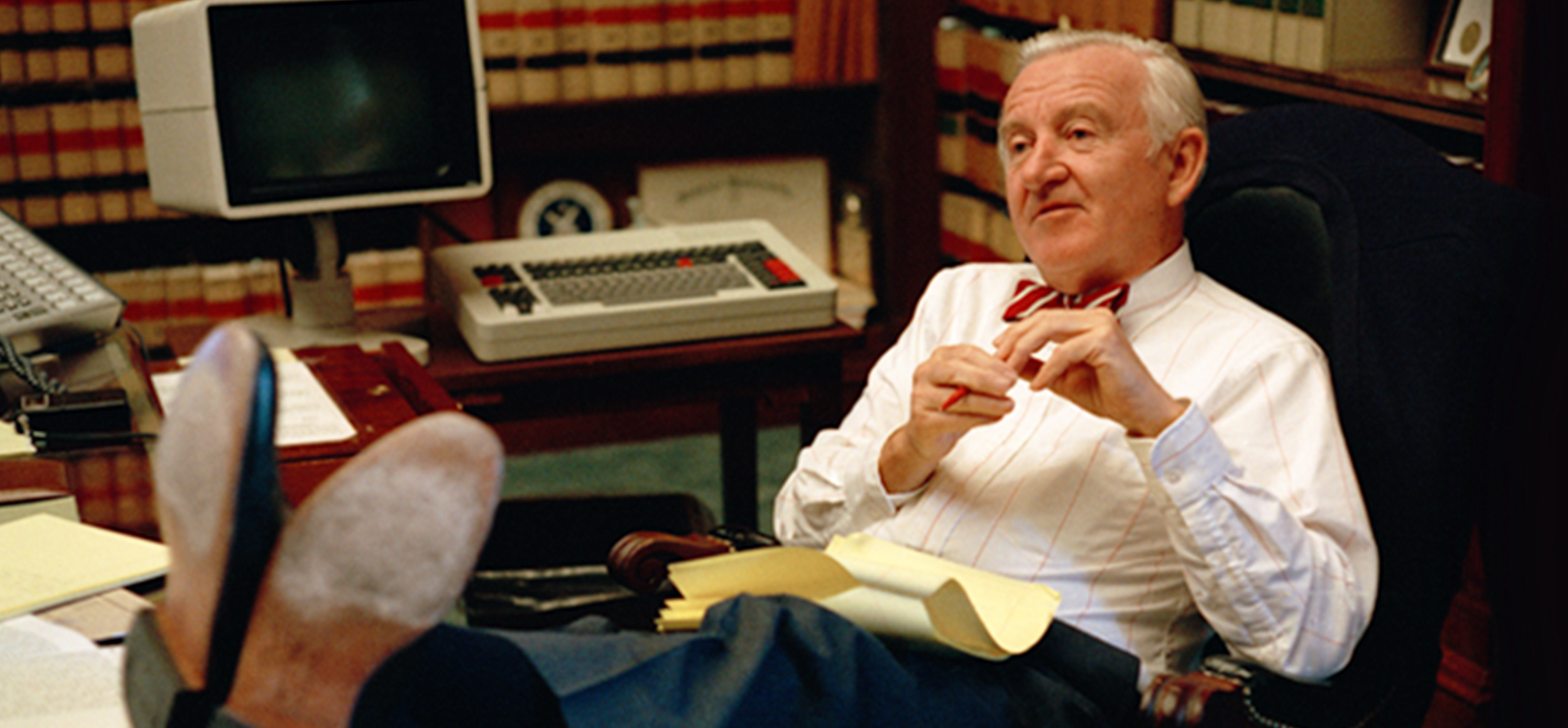
The casual reflections in Five Chiefs reflect badly on Stevens, says Epstein. (Photo by Lynn Johnson/National Geographic)
Former Supreme Court justice John Paul Stevens’ memoir inspires praise and criticism.
John Paul Stevens, U-High’37, AB’41, has lived a University of Chicago life. He grew up in Hyde Park, attended the Lab Schools from kindergarten through high school, and graduated from the College. Even decades into his legal career, the UChicago connections continued: in 1975 former University president and Law School dean Edward H. Levi, then the US attorney general, recommended that President Ford nominate Stevens to the Supreme Court.
Now 91 and retired after 35 years as an associate justice, the third-longest tenure in history, Stevens returned to campus in October on a promotional tour for his book Five Chiefs (Little, Brown, 2011). A line stretched from the International House auditorium, where Stevens would speak, down a hallway as long as a city block, then snaked into a room where the overflow crowd would have to watch on television.
In a genial conversation with Dennis Hutchinson, the William Rainey Harper professor in the College and a senior lecturer in the Law School, Stevens discussed Five Chiefs. It’s a personal memoir of his professional life, focused on impressions of the chief justices he knew as a clerk fresh from Northwestern Law School, as an attorney arguing before the court, and later as a colleague. The hour-long discussion also touched on controversial death-penalty and campaign-finance cases and how much the Supreme Court confirmation process has changed.
Less than three years after Roe v. Wade, Stevens did not face a single question about abortion in his Senate hearing, which was not televised. And when a witness went on at length “claiming that I acted dishonorably in 1967 as counsel to a commission investigating the integrity of an Illinois Supreme Court decision,” Senate Judiciary Committee chair James Eastland spared Stevens from having to hear it. Eastland invited the nominee to his office, where they sipped bourbon while the court reporter documented the “diatribe” for the record. “The statement of the witness is quoted in full in the transcript of the hearings,” Stevens writes. “What Senator Eastland and I had to say in his office was—and shall remain—off the record.”
Not much else remains off the record in the book. Stevens recounts a December 2000 Christmas-party conversation with fellow justice Stephen Breyer about the pending Bush v. Gore case. They agreed, Stevens writes, that the Bush team’s petition to stop the Florida recount was “frivolous.” And he needles William Rehnquist’s penchant for adorning his robes and his prose. “Like the gold stripes on his robes, Chief Justice Rehnquist’s writing about sovereignty was ostentatious and more reflective of the ancient British monarchy than our modern republic.”
The I-House audience gave Stevens a standing ovation, but his musings were not so well received elsewhere, inspiring differing views even within the Law School. In the Washington Independent Review of Books, Geoffrey Stone, JD’71, the Edward H. Levi distinguished service professor, called Five Chiefs “inside baseball at its best,” an “illuminating, instructive, and satisfying” glimpse into the Supreme Court. But Stevens’s memoir—and the informal tenor of his public comments about it—sparked a rebuke from Law School senior lecturer Richard Epstein. In the Hoover Institution journal Defining Ideas, Epstein wrote that Stevens “would be wise to keep these disjointed and cavalier reflections to himself.”
Stevens’s reflections on the 5–4 decision in Citzens United v. Federal Election Commission (2010) that declared corporate campaign-finance restrictions an infringement on free speech especially bothered Epstein. While on the Court, Stevens expressed comprehensive disapproval of the ruling in a 90-page dissent. At International House, he joked that, by the majority’s interpretation, the campaign-funded Watergate break-in would have been considered protected speech.
“What on earth is he thinking?” Epstein writes, noting that the First Amendment does not permit criminal activity and calling Stevens’s dissent in the case “one of his weakest efforts”—perhaps exceeded only by “the weakness of his intellectual thought” revealed in Five Chiefs and his related public appearances.
Epstein does concede that, “as a constitutional matter, Justice Stevens has the perfect right to speak his mind on any issue that strikes his fancy.” About that much, at least, they can agree.
Video
A public discussion with Justice John Paul Stevens, U-High’37, AB’41. The College-sponsored event coincided with the launch of Stevens’s new Supreme Court memoir, Five Chiefs. Dennis Hutchinson, the William Rainey Harper professor in the College and director of the College’s Law, Letters, and Society, led a public discussion with the esteemed jurist that spanned topics ranging from gun control to judicial confirmation hearings.
